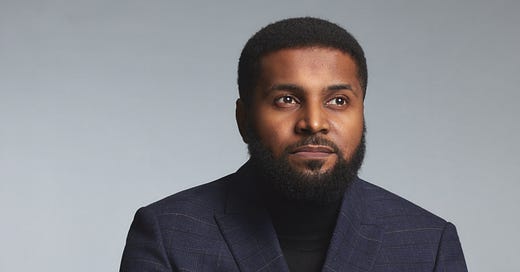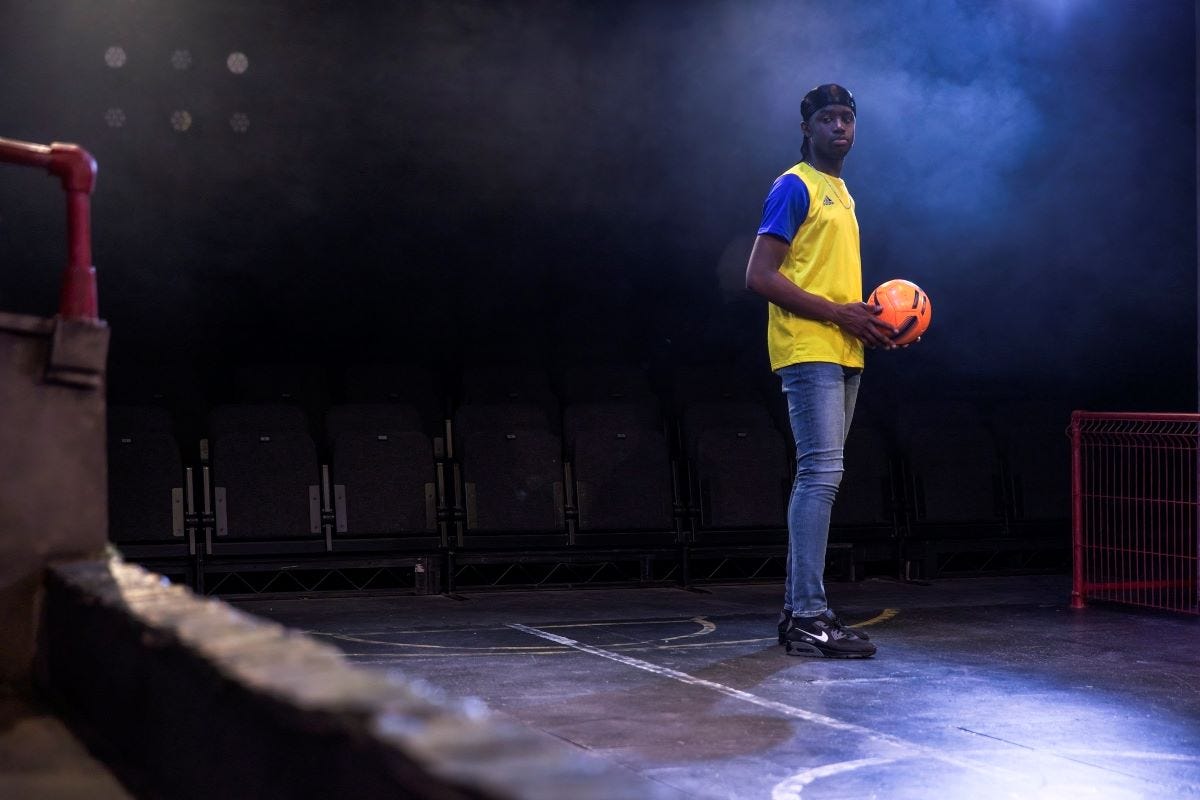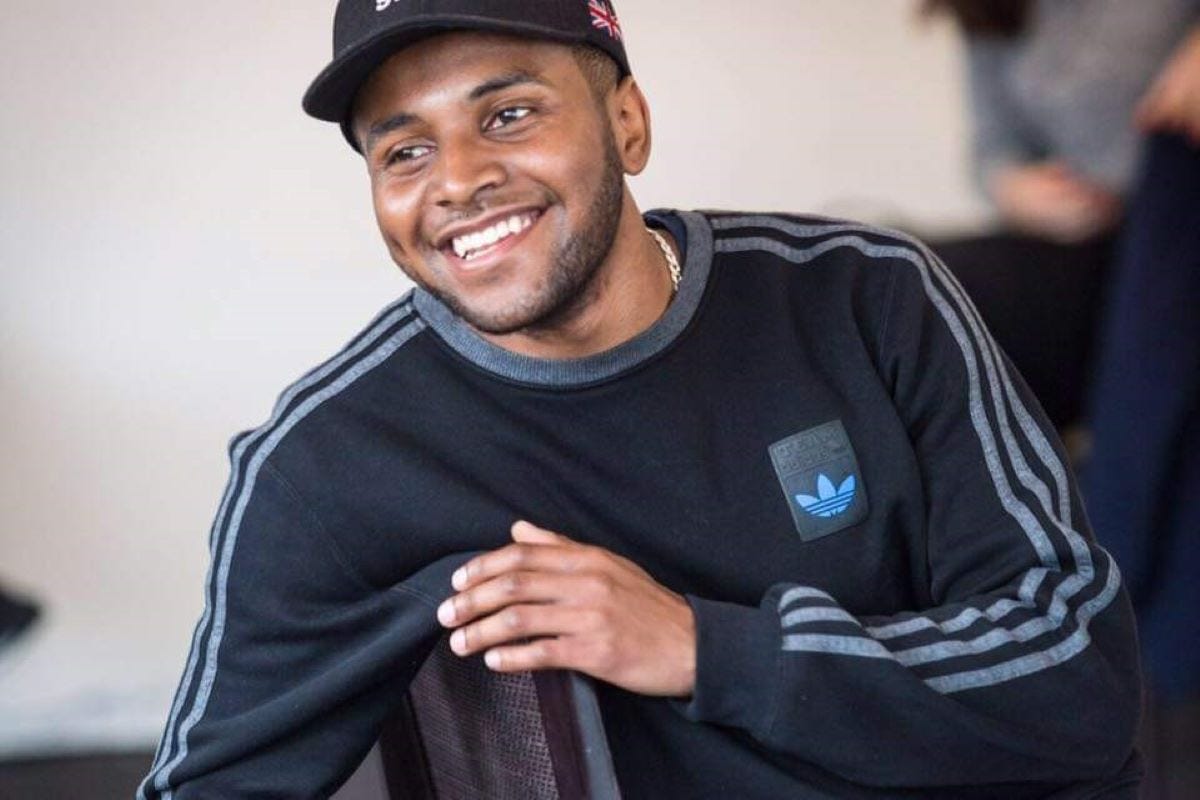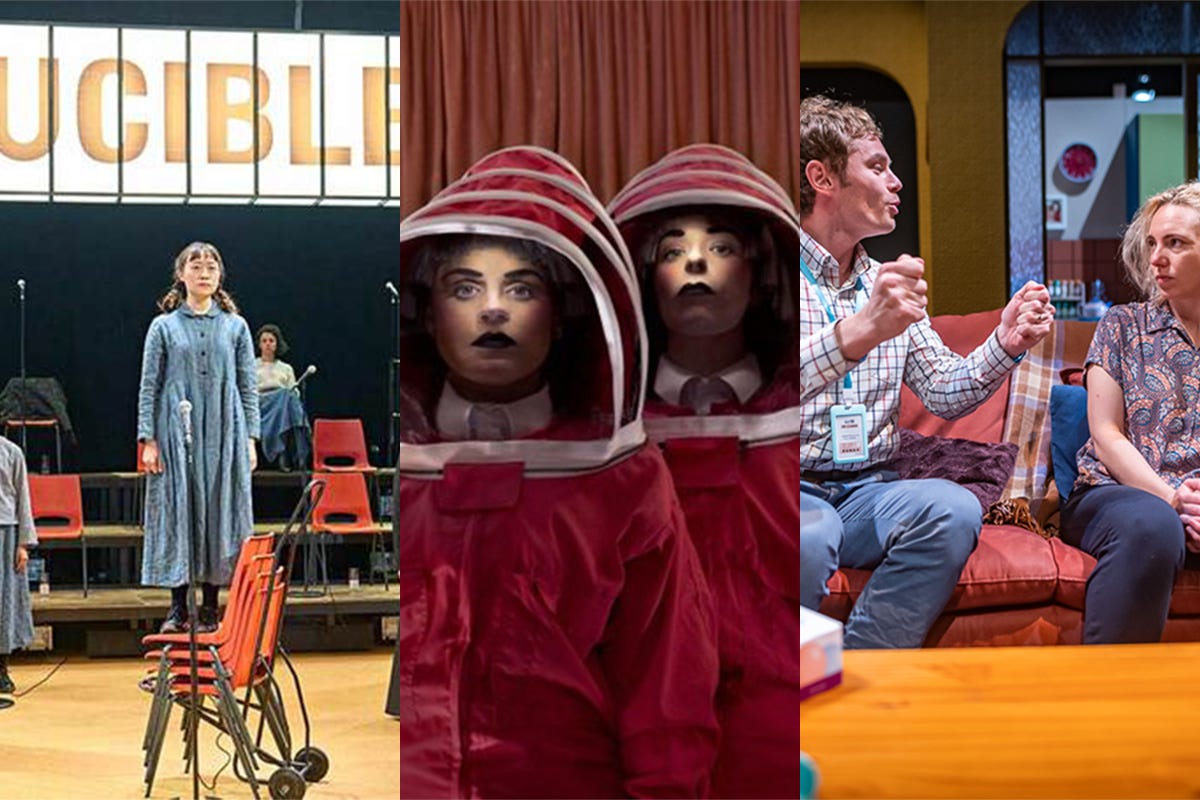"That place was more than a football pitch. It transcended its architecture."
Playwright Tyrell Williams on his award-winning play Red Pitch, which is now running for seven weeks in the West End. Plus: three shows to see next week.
Hello, and welcome to The Crush Bar, a newsletter about theatre written by Fergus Morgan.
This is the free, Friday issue, which usually contains a Q&A with an exciting theatremaker or an essay on an theatre-related topic. This week, there is an interview with Tyrell Williams, creator of #HoodDocumentary - and the meme that came from it - and of the award-winning Red Pitch, which debuted at the Bush Theatre in 2022 and now runs in the West End for seven weeks. After that, there are your usual three show recommendations for next week.
In case you missed it, here is Tuesday’s issue of Shouts And Murmurs, which is a weekly round-up of the most interesting reviews, interviews and other articles on theatre elsewhere…
You can get Shouts And Murmurs straight in your inbox every week by signing up as a paid supporter of The Crush Bar for £5/month or £50/year. If you don’t feel like paying but still want to get the newsletter, then just reply to this email saying so, and I will make that happen.
There are a couple more things you can do to support this newsletter: you can share it with anyone you think might enjoy it and encourage them to subscribe, and you can use it for promotional purposes. There is more info about that here. Right, on with the issue…
Tyrell Williams’ three-handed debut Red Pitch has been on a remarkable journey.
It began as a ten-minute sketch at a new writing festival in 2018, was developed into an 90-minute, fully-staged play at the Bush Theatre in February 2022, returned to the West London venue for a victory lap in September 2023, and is now arriving in the West End for a seven-week run at @sohoplace. It has won heaps of awards along the way, too, and its 29-year-old creator is being hailed as one of the most exciting playwrights to emerge in British theatre in recent years.
If readers are not familiar with Red Pitch yet, they will likely recognise Williams’ screen work - or one shot from it, anyway. In 2015, he created YouTube mockumentary #HoodDocumentary with his friend Kayode Ewumi. Its viral success led to a BBC Three broadcast the following year, and birthed one of the internet’s most popular memes: Ewumi tapping his temple and giving a knowing smile.
Can you describe Red Pitch for anyone that has not seen or read about it yet?
Sure. Red Pitch is a story about football, family and friendship, focusing on three sixteen-year-old, lifelong friends and aspiring footballers. They stumble across this opportunity to establish themselves at professional footballers at an academy, and the play follows them working towards that goal while navigating the many changes happening in their lives, most significantly the changes that are happening to their local area, their South London council estate, which is undergoing regeneration or gentrification, depending on who you speak with.
And Red Pitch was inspired by your own experiences, right?
Absolutely. I was sat on the top deck of a bus one day and it drove past the area where the old football pitches used to be in my council estate. That place was more than a football pitch. It transcended its architecture. It was a place where many friendships were formed, where many important conversations were had. These houses had been built on it. They had been built on my memories. And they weren’t even occupied yet. I felt like they had displaced something that was so significant to me and my friends and had the arrogance of not even bothering to use what they had built.
Football can be a powerful metaphor for belonging, for identity, and for community. It can also lack authenticity and look silly on stage.
The power of football is in bringing people together into communities. Regeneration, or gentrification, or whatever you want to call it puts communities as risk, so football felt like the perfect way to explore that. I didn’t really worry about authenticity, though. I love football. I’m a massive Arsenal fan. I was very much writing about my life and my friends. I didn’t really consider how it would work logistically when I was writing.
Red Pitch has been on a remarkable journey. How did it begin?
It has. I first submitted a ten minute scene to the Young Harts Writing Festival in 2018. You get partnered with a director and some actors and workshop the idea for a week, then present it to an invited audience, who vote on their favourite. I was partnered with the director Daniel Bailey. We were the audience’s favourite. I can vividly remember Daniel telling me that I’d got something and encouraging me to develop it. I extended it into an hour-long show at Ovalhouse in 2019 on a very tight budget. After lockdown, the Bush Theatre wanted to do a reading of it. Then that same day, my agent rang me and said they wanted to programme it. We were workshopping it and redrafting it right up until opening night.
At what point did you know that Red Pitch really resonated with people?
It was probably our third or fourth preview at the Bush Theatre. It just clicked into place as if by magic. It felt really good. I’m so grateful to Daniel and the creatives and cast that have worked on it. I’m so grateful for its success and everything that has come with it, too, but, you know, I didn’t set out in pursuit of that. All I tried to do was tell the story as accurately and as authentically as I could.
I’m grateful to the Bush Theatre, too. I love that venue so much. It is where my favourite show, Misty, came from, and I have seen so much incredible work there. I love how generous they are to new writers. They really allow room for you to develop your craft. I leaned so much from Lynette [Linton, artistic director at the Bush Theatre], from Daniel, and from Deirdre O’Halloran, the literary manager.
Do you think the West End transfer of Red Pitch and the continued success of Ryan Calais Cameron’s For Black Boys… prove that things are shifting in the West End? Do you think that they have proved there is an audience for black stories by black writers, and that those shows can be commercially viable, too?
It is definitely exciting to see black creatives from the African diaspora and the Caribbean diaspora working in the West End. I hope that can continue. I hope it is not temporary. I am mindful about opening doors. Shows that came before Red Pitch helped open a space for us, and I hope that Red Pitch does the same for others.
Representation is really important. I look back at my career and think about how significant seeing artists that looked like me and spoke like me and had a similar cultural upbringing to me was. That had a huge impact on me. I think about young creatives seeing themselves on these stages today. I think about them believing that their stories are important and that telling them on these stages is a realistic goal.
How did you get into theatre and into playwriting?
I was born in 1994 and grew up on the Aylesbury Estate in South London, which is in between Old Kent Road, Camberwell, Walworth Road and Elephant and Castle. It’s on the other side of Burgess Park to Peckham. The Young Vic came into my secondary school to run this programme. Various schools across the borough got to perform at the Young Vic. That was my first introduction to theatre. That and GCSE drama.
I got free tickets to go to the Young Vic and saw a lot of incredible work there that blew my mind, like Simon Stone’s Yerma with Billie Piper. I was part of a community chorus for a show called The Human Comedy there in 2010. I went to college and did drama studies, but realised acting wasn’t my thing. We did Stanislavski and Ibsen and stuff, and I just couldn’t relate to it. I ended up going to Middlesex University to study creative writing and journalism. During that time, I did a comedy workshop at Soho Theatre.
Is that where #HoodDocumentary came from?
Kind of. It had to stop because of some cuts, but the guy that ran it, Lee Griffiths, showed us some videos he had put on YouTube, and the idea that you could just film something yourself and put it online blew my mind. Kayode Ewumi is a friend I went to primary school and secondary school with. We lived in the same area and played for the same football team. I asked him if he would be interested in making something like that and he was like: ‘Yeah, let’s do it.’ We started playing around with a camera, and that is where #HoodDocumentary came from. I’ve been working in the industry ever since.
#HoodDocumentary produced a really well-known meme. How do you feel about that?
I love it. I want the work that I create to have a legacy of some kind. It would be great if we could monetise it somehow, but I’m not sure how to go about that. I’m not sure how Kayode feels about it, though. His face has become kind of ubiquitous.
Was #HoodDocumentary a springboard into a writing career, then?
Definitely. People took me seriously after that. A lot of people reached out to me. A lot of people were interested in working with me. People respected us for doing it of our own accord. They respected our drive and passion. I got an agent from it. I formed some incredible relationships that I have maintained to this day. It was a great launchpad for both of us.
#HoodDocumentary and Red Pitch are very different, but they both seem like very observant, perceptive pieces of work. Are you an observant, perceptive person?
I try to be. I am quite a quiet person. I’m happy just sitting there observing. When I write, I really try to focus on human beings. I think audiences stick with characters more than plots, so I am really invested in finding out who the human is before I figure out what journey they go on and what I am using them to say. That is generally my process. I like to figure out their nuances and idiosyncrasies. I like to understand the things that make them unique. What they say and how they speak comes early on, too. I think that resonates with audiences. With Red Pitch, so many people have told me that the characters are like their brothers or their friends. I love that feedback.
I’m just very interested in humans. We are so connected. We should offer each other more time and grace and really try to understand each other. I love flawed people because we are all flawed. I don’t believe in good people or bad people. We are all a bit of both. We should understand that about each other. That’s what I try to communicate.
What does your life look like now? What are you up to at the moment?
I still live in South London and I’m quite busy. I’ve got another play in the works with Eleanor Lloyd Productions as part of the New Play Commission Scheme run by the Writers’ Guild of Great Britain. That’s really exciting. I am in residence at the National Theatre Studio, too. And I was in LA working on an Apple TV show at the start of the year. Being in a writers’ room was a whole new experience for me. I learned a lot.
Are Arsenal going to win the league?
We’re going to do it. Last season was heart-breaking, but this season it feels like they have learned a lot and understand what is required. Declan Rice was an incredible signing. I’m quietly optimistic. There is a lot of joy around. And we can’t stop scoring.
Red Pitch is at @sohoplace until May 4. For more information and tickets click here.
Three shows to see next week
The Crucible - Sheffield Crucible, until March 30
Apart from the rare novelty of seeing a play in a venue that shares its title, there is a host of reasons to catch Anthony Lau’s revival of Arthur Miller’s classic play at the Sheffield Crucible: Lau and Georgia Lowe’s stylish and stripped-back staging, Simon Manyonda and Anoushka Lucas as John and Elizabeth Proctor, and the fact that it has earned some glowing reviews. You can get tickets via the button below.
Big Finish - Battersea Arts Centre, until March 27
Figs In Wigs is a collective that has been making strange, silly, satirical and synchronised dance-theatre-comedy-performance-art-shows for fifteen years. Their 2019 adaptation of Louisa May Alcott’s Little Women - retitled Little Wimmin - was a big hit. Their latest - and possibly last - show Big Finish arrives in London after running in Manchester in February. It is, apparently, about the death of theatre and the end of the world - but its got jokes. You can get tickets via the button below.
Don’t. Make. Tea. - various, until April 19
Birds Of Paradise Theatre is a Scotland-based, disability-led theatre company. It is celebrating its thirtieth birthday this year with a UK tour of Don’t. Make. Tea., a sharp satire about the welfare state and the hoops it makes disabled people jump through. Written by Rob Drummond and directed by Robert Softley Gale, it opened at the Traverse Theatre last October, when The Scotsman’s Joyce McMillan gave it four stars, and now returns to the Edinburgh venue for two nights before visiting London, Ayr, Glasgow, Cumbernauld and Llanelli. You can get tickets via the button below.
That’s all for this issue
That is it for this week. If you want to get in touch about anything raised in this issue - or anything at all, really - just reply to this newsletter or email me at fergusmorgan@hotmail.co.uk. Or you can find me on Twitter/X, where I am @FergusMorgan.
A quick reminder of the ways you can support The Crush Bar. You can share it. You can use it for promotional purposes. And you can become a paid supporter, which means you get an extra weekly email, Shouts and Murmurs, every Tuesday. There are currently 2700 subscribers, 74 of whom are currently paid supporters. If you would like to join them, you can do so above.
Fergus








